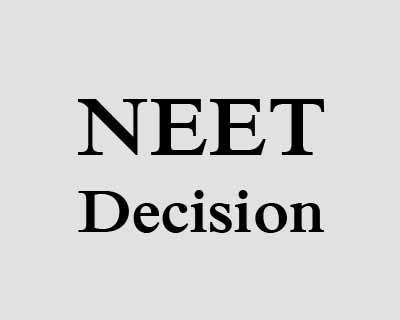- Home
- Medical news & Guidelines
- Anesthesiology
- Cardiology and CTVS
- Critical Care
- Dentistry
- Dermatology
- Diabetes and Endocrinology
- ENT
- Gastroenterology
- Medicine
- Nephrology
- Neurology
- Obstretics-Gynaecology
- Oncology
- Ophthalmology
- Orthopaedics
- Pediatrics-Neonatology
- Psychiatry
- Pulmonology
- Radiology
- Surgery
- Urology
- Laboratory Medicine
- Diet
- Nursing
- Paramedical
- Physiotherapy
- Health news
- Fact Check
- Bone Health Fact Check
- Brain Health Fact Check
- Cancer Related Fact Check
- Child Care Fact Check
- Dental and oral health fact check
- Diabetes and metabolic health fact check
- Diet and Nutrition Fact Check
- Eye and ENT Care Fact Check
- Fitness fact check
- Gut health fact check
- Heart health fact check
- Kidney health fact check
- Medical education fact check
- Men's health fact check
- Respiratory fact check
- Skin and hair care fact check
- Vaccine and Immunization fact check
- Women's health fact check
- AYUSH
- State News
- Andaman and Nicobar Islands
- Andhra Pradesh
- Arunachal Pradesh
- Assam
- Bihar
- Chandigarh
- Chattisgarh
- Dadra and Nagar Haveli
- Daman and Diu
- Delhi
- Goa
- Gujarat
- Haryana
- Himachal Pradesh
- Jammu & Kashmir
- Jharkhand
- Karnataka
- Kerala
- Ladakh
- Lakshadweep
- Madhya Pradesh
- Maharashtra
- Manipur
- Meghalaya
- Mizoram
- Nagaland
- Odisha
- Puducherry
- Punjab
- Rajasthan
- Sikkim
- Tamil Nadu
- Telangana
- Tripura
- Uttar Pradesh
- Uttrakhand
- West Bengal
- Medical Education
- Industry
NEET ISSUE: President seeks legal advice, asks Govt for clarification

President Pranab Mukherjee has sought legal advice on the ordinance to keep state boards out of the ambit of uniform medical entrance examination, NEET, for this year.
The President is seeking clarification on the ordinance, official sources said today, adding he is consulting in house legal experts on certain questions.
The ordinance, cleared by the Union Cabinet on Friday, is aimed at "partially" overturning a Supreme Court verdict which said all government colleges, deemed universities and private medical colleges would be covered under NEET.
Clarifying that the exemption is only for the state government seats, government sources had said that state seats which are earmarked in the private medical colleges have also been exempted.
Different states earmark anything between 12-15 per cent seats in various private medical colleges for state quota so that students from one state can get seat in another state.
The remaining seats in such colleges are reserved for domicile students. Now with this Ordinance, the remaining seats meant for domicile students will come under NEET.
More than 15 states were opposed to NEET and had raised issues like different syllabus and languages during the recent state health ministers' meeting.
The next phase of the exam is scheduled for July 24. Nearly 6.5 lakh students have already taken the medical entrance test in the first phase of NEET held on May 1.
Once the ordinance is issued, students of state government boards will not have to sit for NEET on July 24.
They, however, will have to become part of the uniform entrance exam from next academic session, government sources said.
The exam will be applicable for those applying for Central government and private medical colleges.
They said the students affiliated to state boards will find it tough to appear for the uniform test as early as July and such students will be at a loss compared to those who have followed the central board.
The President is seeking clarification on the ordinance, official sources said today, adding he is consulting in house legal experts on certain questions.
The ordinance, cleared by the Union Cabinet on Friday, is aimed at "partially" overturning a Supreme Court verdict which said all government colleges, deemed universities and private medical colleges would be covered under NEET.
Clarifying that the exemption is only for the state government seats, government sources had said that state seats which are earmarked in the private medical colleges have also been exempted.
Different states earmark anything between 12-15 per cent seats in various private medical colleges for state quota so that students from one state can get seat in another state.
The remaining seats in such colleges are reserved for domicile students. Now with this Ordinance, the remaining seats meant for domicile students will come under NEET.
More than 15 states were opposed to NEET and had raised issues like different syllabus and languages during the recent state health ministers' meeting.
The next phase of the exam is scheduled for July 24. Nearly 6.5 lakh students have already taken the medical entrance test in the first phase of NEET held on May 1.
Once the ordinance is issued, students of state government boards will not have to sit for NEET on July 24.
They, however, will have to become part of the uniform entrance exam from next academic session, government sources said.
The exam will be applicable for those applying for Central government and private medical colleges.
They said the students affiliated to state boards will find it tough to appear for the uniform test as early as July and such students will be at a loss compared to those who have followed the central board.
Meghna A Singhania is the founder and Editor-in-Chief at Medical Dialogues. An Economics graduate from Delhi University and a post graduate from London School of Economics and Political Science, her key research interest lies in health economics, and policy making in health and medical sector in the country. She is a member of the Association of Healthcare Journalists. She can be contacted at meghna@medicaldialogues.in. Contact no. 011-43720751
Next Story


